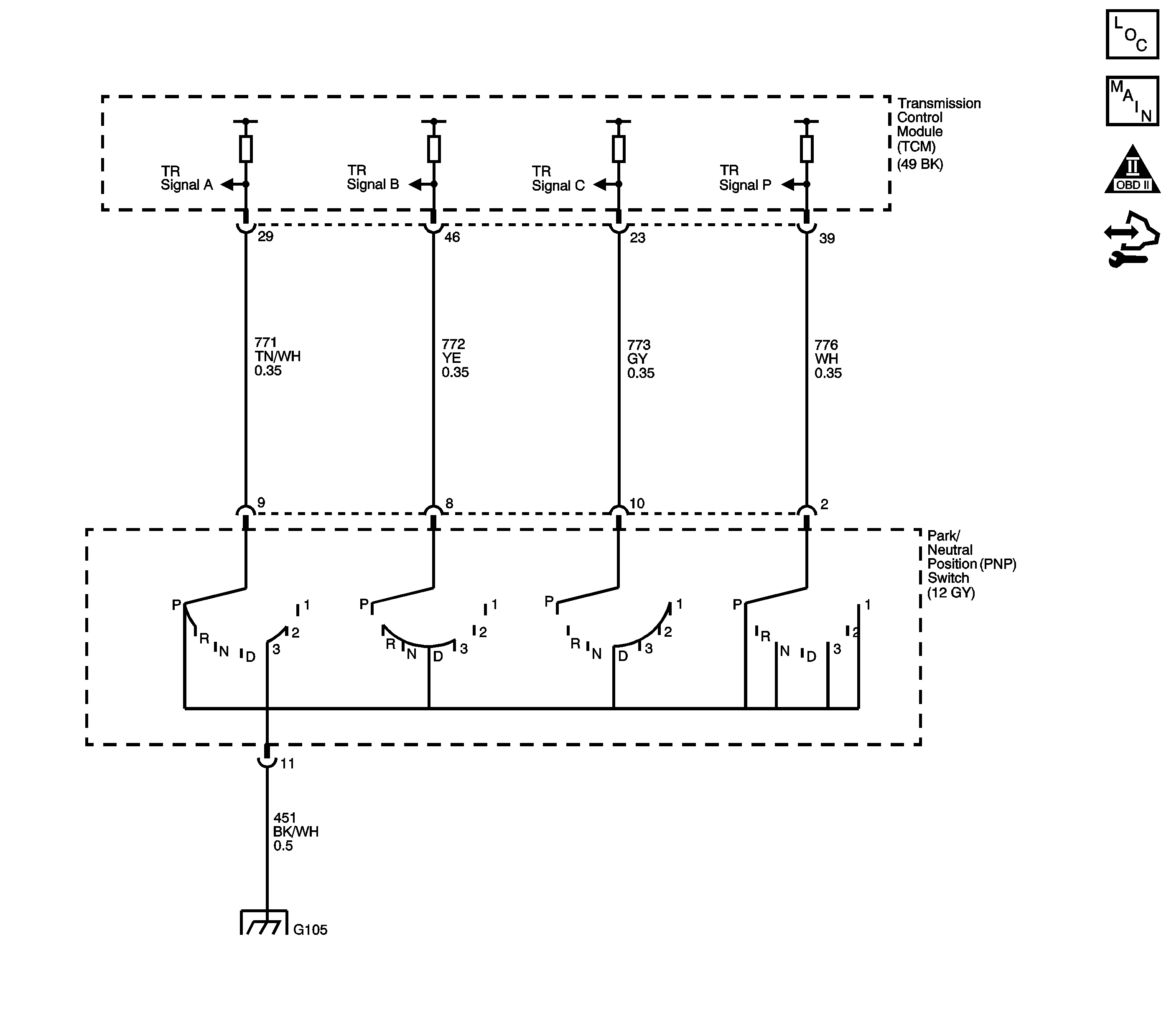
Circuit Description
The transmission range (TR) switch is part of the park/neutral position (PNP) and back-up lamp switch assembly and is mounted on the transmission manual shaft. The TR switch is a multi-signal switch. The transmission control module (TCM) supplies ignition voltage to the TR switch on four signal circuits, A, B, C, and P. Each gear selector lever position grounds one or more of the signal circuits in a unique pattern. In order to determine the gear range selected by the driver, the TCM compares the voltage combination on the signal circuits to a TR switch combination table stored in memory.
Diagnostic Aids
Refer to Transmission Range Switch Logic for valid combinations of switch signal circuits A, B, C and P.
Test Description
The numbers below refer to the step numbers on the diagnostic table.
-
By disconnecting the TR switch, the ground path for all TR switch circuits would be removed and the TCM should recognize all circuits as open. The scan tool should display HI for all range signals.
-
This step tests the TR switch wiring for an open or lack of signal voltage from the TCM.
-
This step tests the TR switch wiring and the TCM by providing a ground path through a fused jumper wire. When grounded, the scan tool range signal A should change to LOW.
-
This step tests the TR switch wiring and the TCM by providing a ground path through a fused jumper wire. When grounded, the scan tool range signal B should change to LOW.
-
This step tests the TR switch wiring and the TCM by providing a ground path through a fused jumper wire. When grounded, the scan tool range signal C should change to LOW.
Step | Action | Value(s) | Yes | No | ||||||||||||||
|---|---|---|---|---|---|---|---|---|---|---|---|---|---|---|---|---|---|---|
1 |
Does each selected transmission range match the scan tool TR Sw. display? | -- | Go to Testing for Intermittent Conditions and Poor Connections | Go to Step 2 | ||||||||||||||
2 |
Did you find and correct a condition? | -- | Go to Step 15 | Go to Step 3 | ||||||||||||||
3 | With the scan tool, observe the TR Sw. A/B/C/P display. Does the scan tool TR Sw. A/B/C/P parameter indicate HI for all range signal states? | -- | Go to Step 12 | Go to Step 4 | ||||||||||||||
Does the scan tool TR Sw. A/B/C/P parameter indicate HI for all range signal states? | -- | Go to Step 5 | Go to Step 9 | |||||||||||||||
Does the voltage measure within the specified value at all four terminals? | 10-12 V | Go to Step 6 | Go to Step 10 | |||||||||||||||
Connect a fused jumper wire from the TR signal A circuit of the PNP switch connector to ground while monitoring the scan tool TR Sw. A/B/C/P parameter. When the TR signal A circuit is grounded, do any other signal circuits indicate LOW? | -- | Go to Step 11 | Go to Step 7 | |||||||||||||||
Connect a fused jumper wire from the TR signal B circuit of the PNP switch connector to ground while monitoring the scan tool TR Sw. A/B/C/P parameter. When the TR signal B circuit is grounded, do any other signal circuits indicate LOW? | -- | Go to Step 11 | Go to Step 8 | |||||||||||||||
Connect a fused jumper wire from the TR signal C circuit of the PNP switch connector to ground while monitoring the scan tool TR Sw. A/B/C/P parameter. When the TR signal C circuit is grounded, do any other signal circuits indicate LOW? | -- | Go to Step 11 | Go to Step 13 | |||||||||||||||
9 | Test the TR signal circuit or circuits of the PNP switch that did not indicate HI for a short to ground. Refer to Testing for Short to Ground and Wiring Repairs . Did you find and correct the condition? | -- | Go to Step 15 | Go to Step 14 | ||||||||||||||
10 | Test the TR signal circuit or circuits of the PNP switch that did not indicate proper voltage for an open. Refer to Testing for Continuity and Wiring Repairs . Did you find and correct the condition? | -- | Go to Step 15 | Go to Step 14 | ||||||||||||||
11 | Test the affected TR signal circuits of the PNP switch for a shorted together condition. Refer to Circuit Testing and Wiring Repairs . Did you find and correct the condition? | -- | Go to Step 15 | Go to Step 14 | ||||||||||||||
12 | Test the ground circuit of the PNP switch for an open. Refer to Testing for Continuity and Wiring Repairs . Did you find and correct the condition? | -- | Go to Step 15 | Go to Step 13 | ||||||||||||||
13 | Replace the PNP switch. Refer to Park/Neutral Position Switch Replacement . Did you complete the replacement? | -- | Go to Step 15 | -- | ||||||||||||||
14 | Replace the TCM. Refer to Control Module References for replacement, setup, and programming. Did you complete the replacement? | -- | Go to Step 15 | -- | ||||||||||||||
15 |
Does each selected transmission range match the scan tool TR Sw. display? | -- | System OK | Go to Step 2 |
